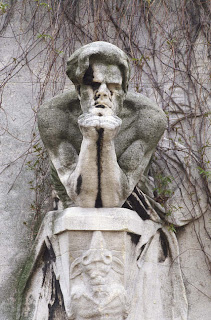
{Photo by rocketlass.}
The impossibility of utopias could be reduced to the fact that it's impossible to describe--and therefore fully to plan--a real city. "Cities," Anderson writes, "are never entirely finished, knowable or singular." Planning can only ever get you so far. Life requires avenues for the unexpected, ability to cope with what emerges--good and bad--without intention from our deliberate actions. Just as no system is wholly self-sustaining, no system is wholly efficient. "It is," writes Anderson, "the by-products that undermine utopias, even unbuilt ones." Those by-products aren't merely the obvious ones--physical waste, dead matter--but the more insidious as well, the stray thoughts, the individuals who can't or won't play along, the unintended consequences of innocent decisions. I wrote last week that every utopia contains its doom; every utopia also is perpetually poised somewhere on the continuum between anarchy and totalitarianism, with the middle ground the hardest to hold. "The future not only has side-effects, it is side-effects," writes Anderson: the death of a utopia will almost always come not through dramatic action, but for simple want of a nail, or, perhaps more commonly, for refusal to accept that a nail is needed.
Yet at the same time, the opening to Anderson's discussion of Plato's Republic offers a useful sketch of the appeal of utopia to a certain kind of mind:
One of the attractions of the utopian island city is that there need be no excess or dissent. . . . To the ominously ordered mind of the pedant, the urge to decide on everything is too much to resist. The all-too-human difficulties and complexities would be forced to yield.Indeed, while my post last week focused primarily on the inevitability of failure in utopias, the question of their appeal is at least as interesting. I find myself thinking of something a friend's kid said a few years ago, a "fact" he stated built entirely on observing his parents: "Girls drink coffee. Boys drink Coke." The world, to a child, can be ordered, and neat, if only enough knowledge is accumulated. Categories apply.
And to some, the pull of order never lessens--the utopian vision is about believing in perfection, yes, but it's also about believing in categorization, and perfect information, and, ultimately, stasis. If, as Donald Pitzer argued in America's Communal Utopias, both adapting to change and failing to adapt to change can be deadly for utopian communities, that is specifically because both decisions reflect the presence of disorder and uncertainty--both cause questioning of one of the bedrocks of the utopian vision, the idea that control, of any sort, can be perfectly maintained. Perfection isn't a state of becoming; it has no past, no future. As Anderson writes, "the price of the future is that you leave the past, never to return." Though it may be unstated, the first thing utopians must banish from their perfect cities is time.
The draw, nonetheless, remains. Anderson quotes Oscar Wilde:
A map of the world that does not include Utopia is not worth even glancing at, for it leaves out the one country at which Humanity is always landing. And when Humanity lands there, it looks out, and seeing a better country, sets sail. Progress is the realisation of Utopias."The journey and the direction, rather than the destination, are the key," Anderson writes. Knowing imperfection, and seeing it everywhere, should lead us to accept it, and halt out thoughts there. Instead, it shadows forth its opposite, perfection, and we obsess. Next time will be different, and next time, and next time . . .
All of which leads to the inevitable elusiveness of acceptance, and contentment, and brings to mind another passage from another book I read today, Monk's-Hood, the third in the series of Brother Cadfael mysteries by Ellis Peters. The Cadfael series, which I'm so happy to have embarked upon recently, is an example of the genre of book, and, specifically, of mystery, of which Rex Stout's Nero Wolfe novels are the exemplar: the comfort mystery, where, for all the crime and murder the books may contain, the point is that each one returns you to a setting, a group, an atmosphere that is reliable, congenial, and therefore, in its own largely unchanging way, even utopian. For Stout, it's the largely self-contained world of a brownstone in 1930s Manhattan; for Peters, it's a twelfth-century English monastery.
Yet neither makes a pretense to presenting an actual utopia, and in fact the first page of Monk's Hood specifically plumps for the virtues of good enough:
Men were variable, fallible, and to be humoured. And the year, so stormy in its earlier months, convulsed with siege and slaughter and disruptions, bade fair to end in calm and comparative plenty. The tide of civil war between King Stephen and the partisans of the Empress Maud had receded into the south-western borders, leaving Shrewsbury to recover cautiously from having backed the weaker side and paid a bloody price for it. And for all the hindrances to good husbandry, after a splendid summer the harvest had been successfully gathered in, the barns were full, the mills were busy, sheep and cattle thrived on pastures still green and lush, and the weather continued surprisingly mild, with only a hint of frost in the early mornings. No one was wilting with cold yet, no one yet was going hungry. It couldn't last much longer, but every day counted as blessing.Acceptance, contentment, the slow turn of the calendar page. These imperfect glories are our lot. We could do worse.

